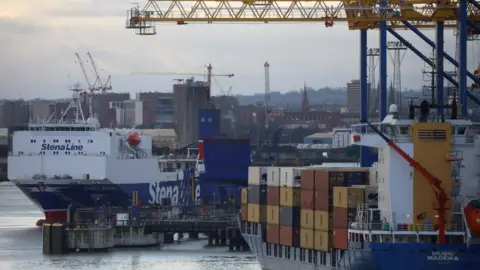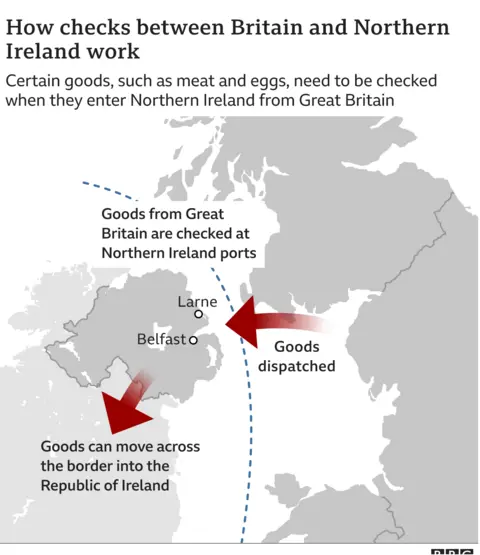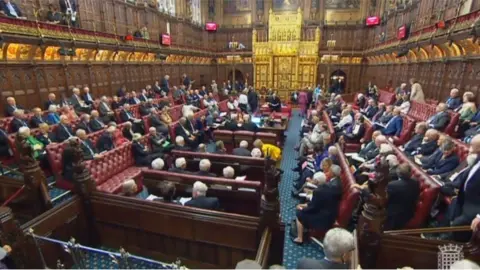NI Protocol: Grace periods should be permanent, says Lords committee
 Reuters
ReutersThe Northern Ireland Protocol grace periods should be made permanent, a House of Lords committee has said.
The protocol is the Brexit deal between the UK and EU which creates a trade border between NI and the rest of the UK.
The grace periods mean that the deal is not being fully implemented.
The UK government is intending to unilaterally override the protocol if the EU does not agree to radical changes.
The protocol was agreed in 2019 by Prime Minister Boris Johnson and subsequently ratified by Parliament.
It keeps Northern Ireland in the EU's single market for goods, avoiding a hard border with the Republic of Ireland.
But it also means checks and controls on goods moving between Great Britain and Northern Ireland, which has caused practical and political difficulties.
The Foreign, Commonwealth and Development Office said legislation to override the protocol would "fix the problems that the current operation of the protocol has created".
The Lords subcommittee on the protocol has been hearing evidence from businesses and politicians.
Some businesses say the protocol is working well for them by protecting all-island supply chains and giving an advantage when trading with the EU.

But other firms moving goods from Great Britain to Northern Ireland say the protocol has added significant costs and complexity.
Controls on GB to Northern Ireland goods movements have never been fully implemented because of grace periods.
These were initially agreed by the EU and UK before being unilaterally extended by the UK.
'Serious economic impact'
They mean, for example, that supermarkets do not require the full range of EU certifications when moving goods and that parcels do not need customs declarations.
The committee says there is "widespread support for the continuation of the various grace periods and derogations, amidst warnings of the serious economic impact should they come to an end without being replaced".
It adds that the EU proposals for reforms of the protocol "appear to be based on the assumption that the grace periods will come to an end, amplified by its decision to continue the infringement procedure against the UK in relation to the grace periods begun in March 2021".
It urges both sides "agree to the permanent continuation of the grace periods and derogations".
 PA
PAIt also says the UK government should commit to the permanent operation of its two main business support schemes, the Trader Support Service and Movement Assistance Scheme.
The EU acknowledges that the operation of the protocol needs to be simplified and has proposed a package of reforms.
However, the UK government has said these do not go far enough and is proposing sweeping unilateral changes to the operation and the oversight of the deal.
A Foreign Office spokesperson said: "Our overriding priority is to protect the Belfast [Good Friday] Agreement in all its dimensions. As it stands, the protocol is undermining this delicate balance of that agreement.
"Our preference remains for a negotiated solution, however, the EU have repeatedly refused to change their mandate so that we can deal with the full range of issues - and their proposals would actually take us backwards from where we are today."
The EU says these unilateral changes will be a clear breach of the deal and of international law.
The UK's plans are laid out in the the Northern Ireland Protocol Bill which passed its final stages in the House of Commons last week, but faces a potentially rough ride in the Lords later this year.
The Lords subcommittee is intending to begin scrutiny of the bill in September.
